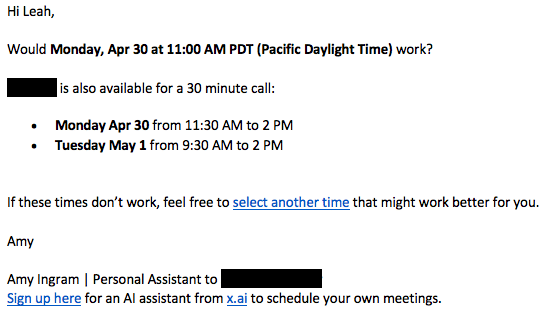“Could you let me know your availability…?”
“Are you free next week…?”
“Can we work to reschedule…?”
These refrains will be familiar to anyone who has worked to schedule meetings. PR practitioners are often faced with the (sometimes challenging) task of scheduling meetings with and for clients, journalists and internal team members. Occasionally, this “ping-pong” of scheduling and rescheduling takes longer than the actual duration of the meeting itself! If only there was some way to automate this mundane (albeit necessary) part of the job…
Enter, artificial intelligence scheduling bots.
A few weeks ago, I experienced my first obvious interaction with one. While the interaction began like any other journalist request for an interview, I was soon directed by the journalist to “work with my scheduling bot, Amy”, who was copied on the message. Thinking that the journalist was simply trying to make a joke in referring to his personal assistant as a “bot,” I sent emails back-and-forth with “Amy Ingram” and we were quickly and easily able to find a workable time for the meeting. Once the time had been confirmed, I noticed a discreet email signature at the bottom of Amy’s messages:
Taken aback, I realized that my interaction with Amy had not, in fact, been with a human personal assistant. I had been communicating with an artificial intelligence program designed to scan the user’s calendar, schedule and confirm meetings. (“Oh, Amy Ingram…AI…I get it now…”) How could I not have realized this was the case?
AI technology is becoming increasingly common in both our professional and personal lives. PR professionals use social media scheduling tools which incorporate AI technology to determine the most effective distribution windows for content. Online retailers use AI to predict buying habits, and streaming content providers base suggested movies and music using AI predictions. Even at home, we’ve become used to asking our AI personal assistants like Siri or Alexa to read the news, look up cooking recipes or ask just how many movies Ben Stiller and Owen Wilson have been in together. (The answer is 12, by the way.)
At Voxus PR, many of our clients work on the cutting edge of the technology industry, so it’s no surprise that these clients would embrace AI as a useful and powerful tool. But how should we as PR professionals feel about AI? So much of success in PR comes from the very human behaviors of building relationships, exercising judgment and adapting to fast-paced, ever-changing environments. Rather than anticipating that AI will replace these behaviors entirely, we should be on the lookout for ways to integrate AI as a tool for providing more enhanced and efficient insights into the work we already do every day.
Here are just a few examples of how PR and AI might go hand-in-hand:
Automating ongoing tasks
Compiling data for reports, updating media lists and (as witnessed above) scheduling client meetings are often cited as some of the highly important, yet often aggravating and time-sucking parts of a PR pro’s day. Embracing AI automation by handing over some of these PR chores could ultimately lead to more time in the day for higher-level creative development, planning and strategy.
Targeting audiences, contacts and publications
By automating the process of narrowing down target audiences, contacts and publications, AI can help provide real-time insight into whether your messaging is reaching the right people in the right places. While it’s ultimately the PR pro’s job to use judgment and common sense when, for example, pitching a story or targeting social content, AI can help more quickly and accurately narrow down where and how you should start.
Measuring social campaign results
When it comes to scheduling and monitoring social media content, AI technology has been around for years…but it’s only going to get better. While today’s social analytics have the ability to churn out important user engagement, interaction and reach data, AI technology has the potential to generate even more specific insights and suggestions. Imagine AI measuring message impact, scanning and compiling other relevant messaging across platforms, or even making suggestions and drafting content based on gathered data. For social media experts, this type of automation and efficiency has the potential to free up significant hours in the day.
Overall, I’m optimistic about the future of artificial intelligence and how it will continue to play an important role in our professional and personal lives. As a PR professional, I’m confident that AI bots won’t be coming to take over and replace our jobs anytime soon. Rather, we need to view AI as a powerful tool for efficiency that can ultimately enhance the job we love. Ultimately, basic human connections and relationship building abilities are at the heart of every PR interaction, qualities that Amy Ingram could never replace.


